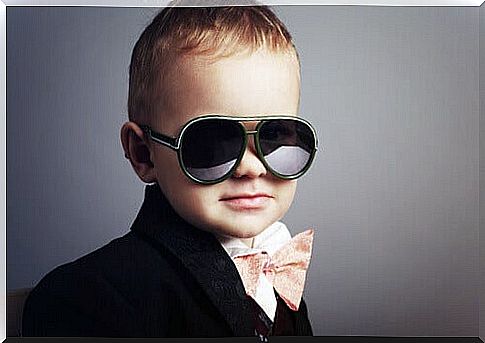5 Signs That You Are Raising Narcissistic Children

Self-esteem is an aspect of children’s education that we parents cannot neglect, because the healthy emotional development of children depends on it. However, so much importance has been given to childhood self-esteem in recent years that many parents tend to go further, to the point of turning their children into narcissists.
A recent study on childhood egolatry revealed that parents who think their children are better than those of others do not help children at all to boost their self-esteem. On the contrary, they harm them, because they increase the risk of making them become narcissists. The study found that to truly boost self-esteem, the important thing is that children feel loved, not that they believe they are better than others.
According to the researchers, when children know their parents think they are “special” and believe they have more rights than others, they can internalize that point of view, eventually feeling superior and turning into narcissistic people. Conversely, when children are treated by parents with affection and appreciation, they internalize the idea that they are important people, a vision that underlies healthy self-esteem.
However, the fact that parents overestimate their children is not the only factor that fuels narcissism in children. Researchers recall that, just like other personality traits, narcissism also has a genetic component and, in part, sees its roots already in the earliest manifestations of temperament. In addition, due to their personal characteristics, some children may be more likely than others to become narcissistic people when exposed to excessive parental attention.
How to know if you are raising a narcissistic child
The traits that we present to you below are clear signs that the educational style you are using to raise your child can favor the emergence of a narcissistic attitude in the child. Paying attention to these aspects and adjusting accordingly will help you ensure that your child has a healthier emotional and psychological development and does not turn into a narcissistic person.
We must not forget that, from a psychological point of view, narcissism is a real personality disorder, which leads to many negative consequences in the people who are affected by it.
1. Make your child believe he is infallible
Some children have a hard time trusting themselves. Even when they are perfectly capable of doing some activities because they have the skills, they remain paralyzed because they feel terrified of the possibility of failure. To boost their self-esteem, you need to trust them, cheer them on and praise them, so they realize they can do it.
However, it is one thing to praise children, acknowledge their victories, celebrate their triumphs, and make them confident in their ability to solve problems and succeed in life; another thing, quite different, is to make them believe that they will never be wrong.
Children need to learn to live with error, and error is the best medicine for the narcissistic child. Indeed, the child should be able to conceive of the error as part of the game and as a useful element for learning. He has to learn to accept it, to fall and get up, just like when he learns to walk. Those who make mistakes at least tried, gave themselves the opportunity to succeed.

2. Continuously compare your child with others to demonstrate his superiority
From the age of 7 or 8, children begin to compare themselves to others. Sometimes the interest in these comparisons begins precisely because of the parents, who are anxious to show how good their children are or how many virtues they have.
These comparisons, however, put children under a lot of pressure, because they make them feel that they cannot be outdone by their peers. When a child stands out in something, it is good to recognize his abilities, but without comparing him to others.
Being good or even being the best at something doesn’t mean being superior, but children don’t see things that way, because they still have a coarse worldview, which they still need to refine. We must therefore be the ones to help them understand that there are always nuances.
3. Offer an educational model unable to accept criticism
Listening to criticism from others is rather unpleasant for most adults, let alone a narcissistic child. But we must be able to accept the criticisms that are put to us in a constructive way and offer children a model that pushes them to do the same. This does not mean having to say yes to everything and lower our heads, but being critical of ourselves, talking about our problems and promising ourselves to improve where we can do it.
If children see that their parents are unable to accept criticism, that they quit when they should evaluate beneficial changes, or that they behave as if they are always right, regardless of the opinion of others, they are very likely to take action. in the same way.
Moreover, some parents are not even able to accept the criticisms that are directed towards their children and react irrationally in order not to have their child get off the pedestal of perfection and superiority on which they have placed him, which is even more dangerous.

4. Brag about the child and justify his mistakes
Let’s be honest. It is one thing to be proud of our son and another, very different, is to boast of him and defend him in the face of any criticism, justifying any mistakes or faults of his in order to prove that he is the best. This behavior won’t make it any better, quite the opposite. Some children who have parents who brag about them react by rebelling, while others feed their narcissism. Neither option represents an easy and healthy path for them.
There is nothing wrong with a child making mistakes every now and then. Nothing happens. We must not be ashamed. Judging his behavior instead of letting him know that one cannot always be perfect deprives the child of a learning opportunity.
5. Speak badly of different or “inferior” children
A different child or a child with less capacity than ours is not an inferior child. Yet, if adults criticize him for a lack of him, be it intellectual or physical or because he dresses differently, their children will also think they are superior, and that others are inferior.
Sometimes this way of negatively judging others is one of the strategies we employ to highlight where we believe we are best. But, for example, that a person is uglier than we are will not make us more beautiful or smarter.
It is not necessary to point out the faults of others to highlight our strengths. But if a parent continues to speak ill of other children to make their own feel more important, they will only be able to make the child internalize this misconception about himself and his worth.









